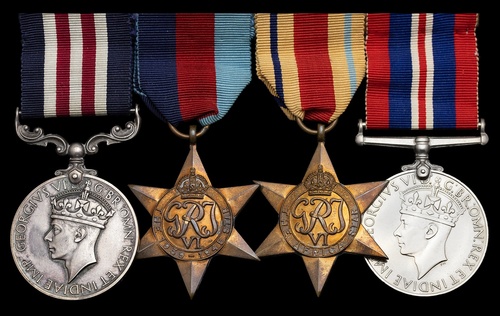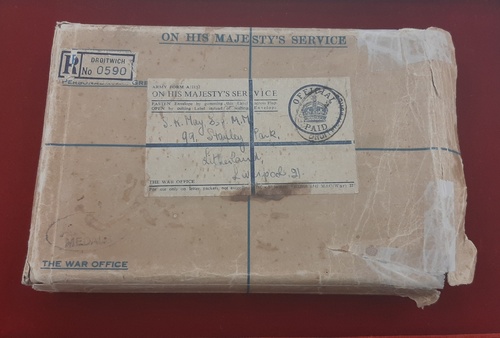Auction: 25001 - Orders, Decorations and Medals
Lot: 365
(x) A very fine 1945 M.M. group of four awarded to Private S. K. May, Cameron Highlanders, who was present during the Fall of Tobruk; on that day the Battalion marched into captivity to the skirl of their pipes
Military Medal, G.VI.R. (2929616 Pte. S. K. May. Camerons.); 1939-45 Star; Africa Star; War Medal 1939-45, very fine (4)
M.M. London Gazette 11 October 1945.
Stanley Kitchener May was born at West Derby, Lancashire on 9 June 1916, the son of Robert and Ellen May. He enlisted in Liverpool on 29 August 1939 and was posted to the 2nd Battalion Cameron Highlanders, being sent to Middle East. They were part of the British garrison caught at Tobruk in June 1942 by the German counterattack in the Middle East.
The final attack occurred on 20 June with the Camerons being isolated by a sharp offensive which saw German panzers taking the centre of the city that same day. May was listed missing on 21 June 1942 and taken prisoner of war, the Battalion made quite the impression as they went into captivity with an account of their march given by Sergeant Lloyd, South African Armed Forces, to Outspan magazine:
'It was mid-day when we heard it. Faintly at first and then louder it came, a rhythmic swinging sound, unexpected but unmistakable - the skirl of pipes. We scrambled out of our shelters to look, and saw, swinging along bravely as though they were marching to a ceremonial parade, a tiny column of men, led by the pipes and a drum, with the Drum-Major striding ahead. Silence fell as they came, and the drum tapped the pace for a moment as the pipers gathered their breath. Then, as they wheeled in towards us, they broke into Pitbroch o'Donuil Dhu with all the gay lilt of the Highlands and all the defiance and feeling any Scot can call out on his pipes. Smartly they march to attention, and halted as if on parade. To the strains of their regimental march the Camerons had come in to surrender'
May was taken initially to Camp No 78 at Sulmona, Italy and later Stalag 11b/357, Fallingbostel, Germany. He was reported liberated on 9 June 1945, likely at Fallingbostel which was the first P.O.W. camp to be liberated. It should be noted that no recommendation has been found for the award however it is likely either related to his actions at Tobruk or time as a P.O.W.
A passenger list has him going from Liverpool to Wellington, New Zealand in 1950 where he appears to have been working. May was living at Upper Hutt, Wellington and made a living as a rubber worker between 1950 and 1981.
Sold together with copied research and an archive of original material including:
i)
A Regimental tie.
ii)
Soldier's pay book.
iii)
Soldier's release book.
iv)
Two army forms named to the recipient.
v)
A compliment slip from the New Zealand High Commissioner.
vi)
Medal slip of issue.
vii)
A spare strip of M.M. riband.
viii)
A named message of congratulations from the King.
ix)
All contained within an original war office medal box of issue named to the recipient.
Subject to 5% tax on Hammer Price in addition to 20% VAT on Buyer’s Premium.
Estimate
£1,000 to £1,400
Starting price
£800







